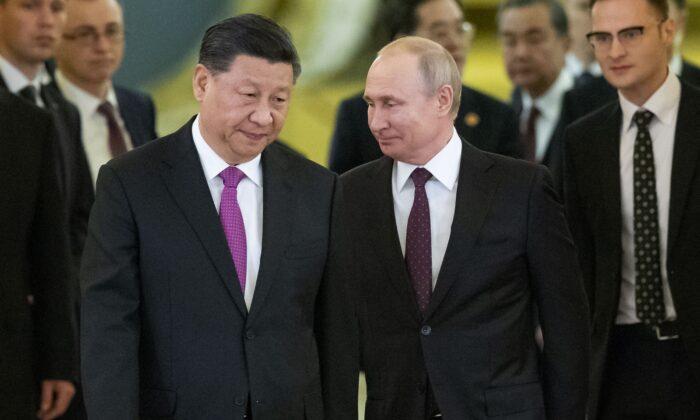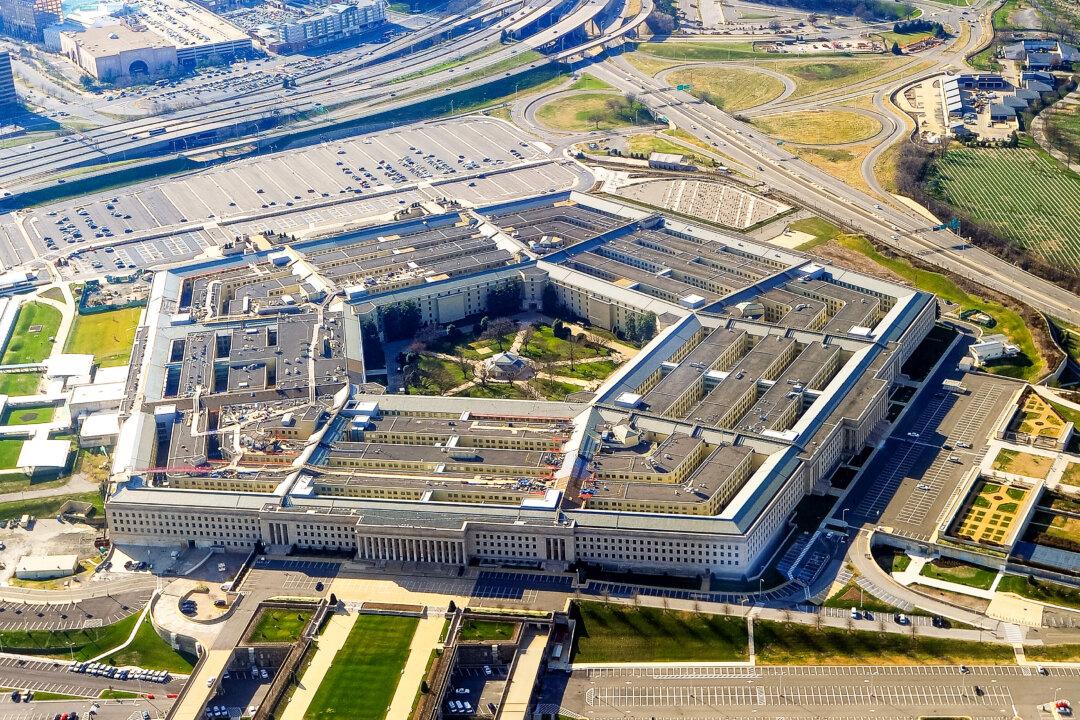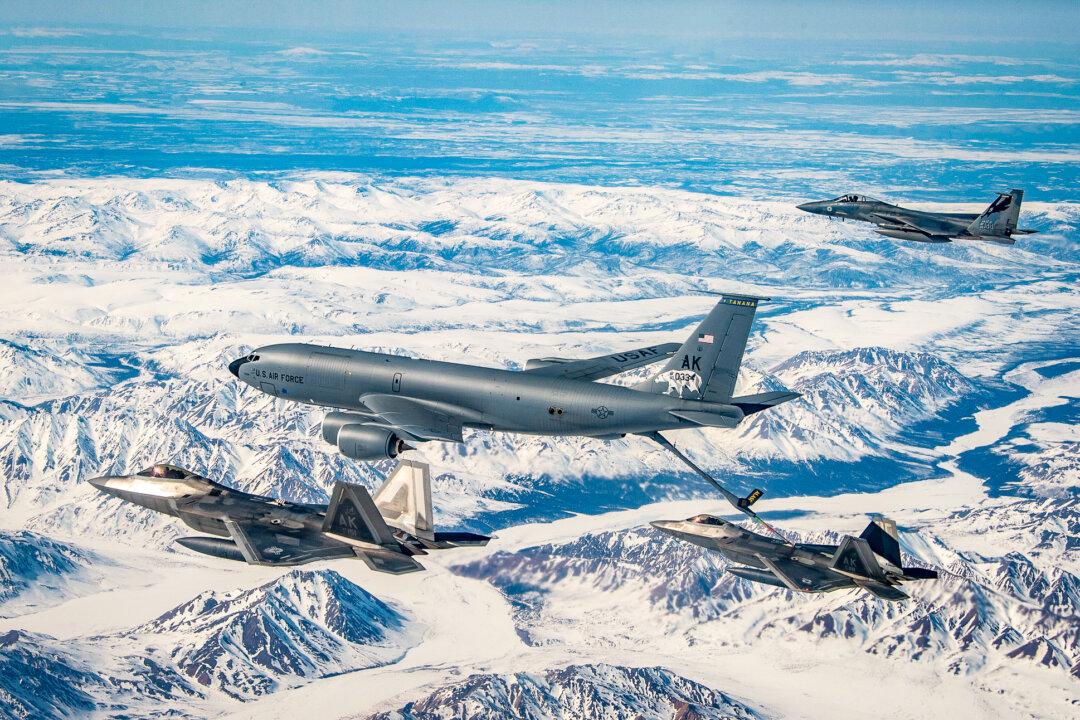Decades-long divides between China and Taiwan, Russia and Ukraine, and Iran and Israel are capturing the world’s attention as tensions mount in each of the three distinct areas of the world. Experts spoke to The Epoch Times about the role of the United States in each potential conflict area.
David Wurmser, a senior analyst at the Center for Security Policy, a Washington-based think tank said, “it’s inescapable that the United States is in a period where there’s significant domestic exhaustion with foreign policy, partly because of the internal consumption of the country’s own upheavals, both culturally and ideationally.”
He said it is important to recognize that “the country is not in the place it was during the Cold War, when the nation fundamentally and profoundly understood that every aspect of its way of life was tied to freedom in the world.”
At this time, “it was a vital national interest to aggressively defend freedom in as broad and as robust a way as possible, everywhere possible,” Wurmser said.
“The world has not changed,” he said, adding that there are still serious threats to freedom represented by various nations around the world. These include, but are not limited to, the Chinese regime’s embrace of communism and heightened interest in seizing Taiwan, Russia’s designs against Ukraine, and Iran’s modern Islamic theocracy and its desire to annihilate Israel.
Wurmser is convinced each of these poses a “fundamental and profound threat” to the free world’s way of life. “The United States cannot enjoy the luxury of being an isolationist or being hands-off on any foreign policy or foreign military action, today.”
“The world is in need of a much more present America,” he said. “It is past time to establish a seriousness internationally that the United States is returning to the international scene.”
There are nations under persistent threat, and they are looking to the United States to be the champion of freedom, Wurmser said. “The United States must start exacting a price on its enemies and send a signal that we can make life miserable for each of them in some way or another.”

China
The United States maintains robust ties with Taiwan under the Taiwan Relations Act, under which Washington is obliged to supply self-ruled Taiwan with the means to defend itself.The U.S. government has also adopted a policy of “strategic ambiguity” in relation to the island, wherein Washington is deliberately vague on whether it will come to Taiwan’s defense in the event of a Chinese invasion.
According to global strategist Col. Dan Steiner (USAF-Ret.), “if a sustained operation were to commence between China and Taiwan, it would be difficult and time-consuming, [adding that] it would also greatly increase the chances of open confrontation between the United States and China.”
Lt. General (ret.) Jerry Boykin, executive vice president of Christian non profit Family Research Council and founding member of the Army’s Delta Force, doesn’t believe an escalated conflict would bring American foot soldiers to the region. Steiner agreed, stating that “an open conflict with China over Taiwan would be an extremely hard sell to the American people.” What’s more, he said, the Chinese regime’s “superior force density in the region” give them quite an advantage.
As a result, it would be in the best interest of the United States to prioritize the supply of “warfighting materiel” to Taiwan and the gathering of intelligence, according to Boykin.
Additionally, Wurmser said the United States has been “inattentive for at least the last 20 years, creating serious supply and trade dependencies on our adversary,” including the Chinese regime. The United States, he said, needs to “begin to reorient our economy and our dependency on allies rather than on adversaries.”
Rather than merely sanctioning China, Wurmser also suggested the United States make its best attempt to “sever” its ties to China. “Returning to a Cold War structure where two separate economies begin competing with each other with little interaction would almost certainly cause the Chinese threat to fade away,” as China’s economy survives only because it’s integrated into the U.S. economy.

Ukraine
A second flashpoint is rapidly unfolding in Eastern Europe. Boykin said a looming Russia-Ukraine conflict appears inevitable. With Russian President Vladimir Putin acting as “essentially an oligarch,” his actions could provoke military action.Although some U.S. citizens may have an emotional desire to want to defend Ukraine, Boykin said he does not believe the American people want to put American lives at risk by “putting boots on the ground.”
In light of the 20-year war in Afghanistan, Boykin said “America does not want to see the young men and women of America dying while coming to the aid of another country.”
“What the United States is doing right now is what should have been done at least six or more months ago.” The U.S. and allies are sending weapons and supplies into Ukraine as the fear of war mounts.
By providing “lethal aid” to the Ukrainians, Boykin said the country has “a better chance of making it a bloody fight for the Russians.” And this, he said, would “make the Russian people themselves question if [a fight for Ukraine] is really worth it.” The goal is to have Putin question his decision to enter Ukraine without deploying U.S. troops to the battlefield, he added.
Steiner agreed, saying that “bogging down the Russians is not a matter of U.S. troops on the ground, but providing specific types of weapons systems that make it extremely difficult for their enemy to maneuver in the open.”
“Supplying Ukraine from its western borders is a viable option given the nation’s natural boundaries with Poland and other members of North Atlantic Treaty Organization (NATO),” Steiner pointed out.
Ultimately, the hope is that Ukraine will be able to prevent Russia from getting such a foothold in Eastern European country in such a way that would topple the government, he said. “Russia’s ability to overcome Ukraine is not in doubt, but their ability to effectively control the area, post-conflict, could be greatly impacted by U.S. support,” Steiner said.
An important question to ask, according to Steiner, is “should Russia take the Ukraine, do they actually have the ability govern it thereafter?” In the end, he suspects a move by Russia to invade Ukraine would “become nothing more than a money and manpower drain to the Russian people.”
Wurmser concurred, saying that “Russia is already not playing with a strong deck, economically.” If the United States were to impose heavy sanctions, he said Russia’s internal economic crisis would be further exacerbated. “In the long term,” he said, “the already suffering economy could bleed down the same way the Cold War essentially buried them, to the point where they were no longer competitive.”

Israel
A third U.S. ally, Israel, continues to find itself in the crosshairs of a nuclear-capable Iran that wants nothing more than to wipe the country off the earth, Boykin said. Even as negotiations in Vienna continue over Iran’s return to the 2015 Joint Comprehensive Plan of Action, Israeli Prime Minister Naftali Bennet recently stated that “the Israeli strategy [to protect themselves] doesn’t depend on whether there’s an agreement or not.”In the event of a full-scale attack by Iran against Israel in the future, Boykin said it would be imperative to provide “the latest materiel” to the already formidable U.S. ally. Historically, the United States has helped supply Israel with weapons systems to fend off its adversaries, dating all the way back to the Yom Kippur War of 1973, he said.
Unlike the Russia-Ukraine conflict, in this scenario, Boykin believes “putting boots on the ground” is a scenario that could likely be tolerated by the American people. But America’s decision to do so could be greatly affected by who is president of the United States at the time.
If the Israelis wanted the assistance of U.S. troops on the ground, Boykin said, the odds of it happening would dramatically increase with conservative leadership in the White House that is supportive of the Jewish state.
Boykin said a conflict over Israel “wouldn’t necessarily require foot soldiers,” suggesting that air support and assistance in reconnaissance operations may be enough for the Middle Eastern country to defend itself.
“Immediate support operations to any conflict between Israel and Iran would be critical to Israel’s overall success,” Steiner said. “Such support could include deploying forces to key nations in the region such as Saudi Arabia and other Gulf nations.”
Like Boykin, he said, “this kind of support should be based on providing defensive air support of Israel, intelligence gathering, as well as logistical support for follow on operations.”
Wurmser said that sustaining Israel is particularly important to the rest of the world. “The rise of Israel as a center of innovation and long-term abstract thinking in technology has made [the country] an outsized importance to new economies developing around the world.” Thus, he said, “the anchoring of Israel to the West and the preservation of Israel is a fundamental national importance.”
He added that “Iran needs a lot of money to conduct a robust foreign policy that projects an image of power.” Sanctions could weaken Iran in many ways, including the stifling of its ability to build weapons and sustain its nuclear threats against Israel.




